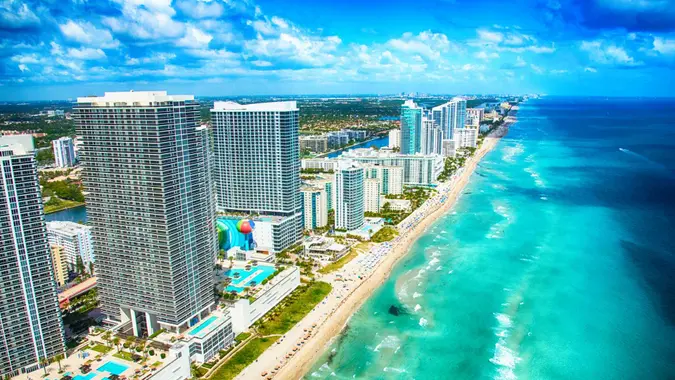Thinking About Starting an Airbnb? What Every Host Needs to Know

Commitment to Our Readers
GOBankingRates' editorial team is committed to bringing you unbiased reviews and information. We use data-driven methodologies to evaluate financial products and services - our reviews and ratings are not influenced by advertisers. You can read more about our editorial guidelines and our products and services review methodology.

20 Years
Helping You Live Richer

Reviewed
by Experts

Trusted by
Millions of Readers
Airbnb disrupted and democratized the vacation rental industry more than 15 years ago, but for investors and side hustlers with the means, ambition and knowledge to make it work, now could be a good time to get in on the action.
Grandview Research projects the $68.64 billion U.S. short-term vacation rental market will grow at a compound annual growth rate of 7.4% between 2025 to 2030.
This guide will explain the process of becoming an Airbnb host, how to make money on Airbnb, the potential risks and downsides, and reveal what kind of Airbnb income you stand to earn.
What You Need to Start Hosting on Airbnb
The most basic requirements to start an Airbnb business are:
- A space to rent: A physical space is the primary asset, but it doesn’t have to be a vacation property or even a house. A cabin, cottage, apartment, guesthouse or even a room is enough for a listing.
- Legal permission and regulatory approval: Zoning laws, HOA rules, and laws governing rent-controlled units can impede prospective Airbnb hosts, as can restrictions on short-term rental permits, occupancy limits, primary residence requirements, annual rental limits, and other legal restrictions.
- Infrastructure and access: You must also have the minimum required internet connectivity, safety measures, basic furnishings, utilities and amenities. Prioritize state and municipal rules and codes as part of your preliminary research.
Step-by-Step: How to Become an Airbnb Host
Here are the basic steps to becoming an Airbnb host.
- Create an Airbnb account
- Create a professional, well-written listing with high-quality photos that accurately represent the space, along with a detailed and honest description that clearly states the property’s rules and availability.
- Price your space competitively by researching comparable local listings and setting a base price that covers your costs and allows for a profit, while remaining flexible to account for seasonality and shifting demand.
- Prepare your space for guests by cleaning and putting safety, comfort and security measures in place.
- Go live and start accepting bookings.
- Communicate with guests and manage the experience.
Make your listing and space stand out. Offer local insight into experiences, attractions and entertainment in the area, provide unique features like fully stocked coffee bars or gaming systems, and provide clear, concise guides showing how to get the most out of their time in your space.
How Much Can You Make on Airbnb?
How much you can earn depends on a variety of factors, from the type of property and amenities offered to its location and how often it’s available. Understanding what drives nightly rates and overall revenue can help you maximize your earnings and avoid costly missteps.
You’ll Have To Spend Money to Make Money
According to the most recent research from short-term rental data and analytics firm Airdna, the average host earns about $14,000 per year in supplemental income despite monthly revenue averaging $4,300.
Top-line revenue over $50,000 can shrink to such a low bottom line because of the many expenses of hosting, including:
- Mortgage payments
- Taxes
- Cleaning and management services
- Platform fees
- Maintenance and repairs
- Legal fees
- Insurance
- Marketing and advertising
- Rental losses
Key Factors That Drive Airbnb Rates and Revenue
Several key variables impact rates, revenues and profits, including:
- Property type: Houses average $4,700 per month compared to $3,800 for apartments and $2,200 for unique or novelty properties like tiny houses.
- Amenities: Properties with hot tubs earn $6,500 per month compared to $3,800 for those without. A parking spot can earn you $400 extra per month on a $4,000 listing.
- Availability: Spaces rented up to 180 days per year average $3,100 per month compared to $4,800 for year-round properties.
- Seasonality and tourism: Many locations experience peak and off-peak seasons, resulting in substantial monthly revenue fluctuations. Properties in tourist hotspots earn more than comparable spaces elsewhere.
- Location: Nothing impacts rates more than location, and it usually requires a familiar tradeoff. High-demand markets like Miami Beach or New York City have astronomical nightly rates, but with tighter restrictions, greater expenses and ferocious competition from industry heavyweights.
Advantages and Disadvantages of Hosting on Airbnb
Consider the potential benefits and drawbacks before you invest your time, energy and money.
Pros:
- Potential for steady income
- Flexibility
- Put an unused space to work
- The Airbnb platform streamlines marketing, advertising and booking
- Interaction with people from varied places, backgrounds and cultures
Cons:
- Requires time and effort
- Regulatory compliance can be complex and frustrating
- Potential for guest damage
- Risk of unbooked nights, increased operating costs and new regulations
Tips for Running a Successful Airbnb
If you don’t farm out management to a specialized company, focus on the following Airbnb hosting tips on how to make money on Airbnb.
- Keep the space spotless and well-maintained.
- Use dynamic pricing tools like PriceLabs or Airbnb Smart Pricing to set competitive, real-time rates based on local demand.
- Offer high-value amenities–hot tubs, pools, and washer/dryers boost revenue most, while TVs, Wi-Fi, kitchens, and pet-friendly policies also add value.
- Add thoughtful touches, such as handwritten notes or welcome gifts like gourmet snacks or coffee.
- Act on guest feedback quickly, address concerns, and make improvements to avoid repeat issues.
Airbnb Hosting and Taxes: What to Know
Hosting on Airbnb has tax implications. Under the IRS “14-day rule,” you can exclude all rental income from taxes, provided you:
- Rent the space for no more than 14 days in the tax year.
- Inhabit the property at least 14 days during the year or 10% of the total days you rent it at fair market value.
Otherwise, you must report your income on Schedule C or Schedule E through Form 1040. If your Airbnb endeavors are considered a business, you’ll have to pay self-employment taxes. Those who meet certain thresholds will receive a 1099-K from Airbnb, but you are responsible for determining whether you owe any state and local occupancy or short-term rental taxes.
Hosts who rent out a room in their primary residence, or a similar shared-space setup, typically need to split expenses between personal and rental use when reporting to the IRS.
Smart move: Track every rental detail, from income to maintenance, for both tax reporting and deduction claims.
Is Starting an Airbnb Right for You?
Airbnb can be a great way to earn extra income, but it’s not for everyone. Before listing your space, check local laws and HOA rules. Some cities limit or ban short-term rentals, and breaking those rules can result in hefty fines.
Treat it like a business: compare your estimated earnings (using tools like AirDNA or Mashvisor) against costs like your mortgage, taxes, insurance, utilities, cleaning, supplies, and platform fees. Remember, bookings fluctuate–especially off-season–so keep a cash buffer.
Hosting also takes time. Even with automation, you’ll handle guest questions, restocking, cleanings, and maintenance. If you’re short on time, a co-host or property manager can help–but they’ll take a cut of your earnings.
Short-term rentals also bring more wear and tear, plus liability risks. You may need extra insurance coverage to stay protected.
Bottom line: Airbnb can be profitable if you’re prepared for the legal, financial, and time commitments. But if you want steady, hands-off income, a long-term rental or traditional investment may be a better fit.
FAQ
- What do I need to start an Airbnb?
- The basic components are a space to rent, legal permission and the minimum residential infrastructure required by law and market demand.
- How much money can I make with Airbnb?
- The average profit is $14,000 per year, but many variables will impact what you do or don’t earn, including location, property type, amenities and expenses.
- Do I need a business license to host?
- Some, but not all, jurisdictions require hosts to register their services as a business.
- Can I Airbnb a room in my house?
- Hosts in many locations can rent out a single room.
- How do I get more bookings as a new host?
- Hosts have many means to book more nights, including lowering rates, improving the guest experience, adding amenities, optimizing their listings and getting the most out of Airbnb's suite of tools.
 Written by
Written by  Edited by
Edited by 

























